On Sunday, the third season of Showtime’s The Chi ended just as the season began: with a wedding and a funeral. The episode also concluded a season’s long shift, away from the rich but almost exclusively male-centric stories that highlighted its first two seasons and towards more equitable storytelling. The show’s new direction brought the storylines of five black queer and trans women — one who’d existed on the show’s periphery plus four all new characters — to the forefront. Suffice it to say, Lena Waithe knows how to get our attention.
With that influx of gay energy, Carmen and I had to have a conversation about The Chi’s third season. Our TV Team has always been quick to ask showrunners to “make it gay” and finally, someone listened. But did making The Chi gayer turn it into a better show? We looked at what worked, what didn’t work and what scene we’re still drooling over rewatching periodically on our DVRs.
Carmen: Those who’ve never seen The Chi are probably wondering why we are covering a show in its third season with a full post when we never have before. So, what is The Chi? And why haven’t we talked about it before now?
Natalie: Though in terms of creation, Twenties actually predates it, The Chi is Lena Waithe’s first solo production to make it to air. It’s about life in her hometown on Chicago, Illinois.
One of the things that Lena talked a lot about during publicity for the first season was how she wanted to really humanize the experiences of the people who lived in the city. All too often we hear stories about Chicago that treat it is this flat, one-dimensional stereotype — one that the president employs with regularity — but she wanted to provide more dimension, more depth to what we see.
As for the reason that we haven’t really talked about it at Autostraddle… despite Lena Waithe’s involvement, the show wasn’t really gay? We learned in Season One (I think) that Kevin’s mom had a girlfriend but that was about the extent of it.
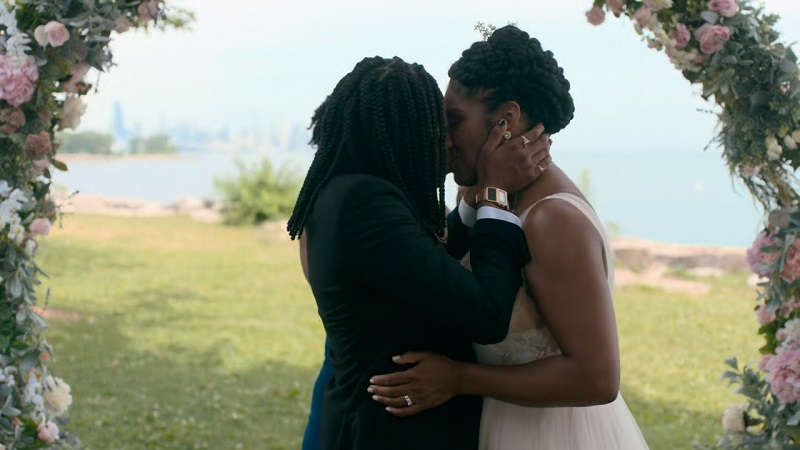
Miriam A. Hyman as Dre and Tyla Abercrumbie as Nina, The Chi Season Three
Carmen: Yeah, we are first introduced to Kevin’s two moms very early in the first season — Nina, and her partner Karen. They were pretty inconsequential to the series, you’re right. When the show first premiered, I wrote about them that “I wish there was more direct plot [about Nina and Karen] to share. There’s lots of fun teasing and love shared and television trope of parents embarrassing their kids, except this time centered on two black lesbians living in the city. That’s a rare gem worth noting all by itself.” But a lot has changed quickly in terms of black lesbian representation since 2018 (to be fair in part because of Lena Waithe’s work). I think it’s acceptable to say it’s past time we demanded more.
This is complicated to explain for those who haven’t been watching the show, but this year “Karen” got switched out for another entirely different masc black lesbian named “Dre.” I won’t necessarily ding The Chi for making move so notorious in television it has its own nickname (I’m guessing straight white people probably reference the two Darrins from Bewitched in this moment, but this move will always be known as pulling an “Aunt Viv” to me).
Natalie: I didn’t even notice it at first! That’s how little they were part of the series… they swapped Karen out for a whole ‘nother chick this year and I didn’t even notice it until you pointed it out after the Season Three premiere!
Carmen: Hahahaha, yeah! But once it became clear where this season of The Chi was going, I understand looking to move into an actress who could hold the weight that would be placed on Dre’s shoulders.
Natalie: But even beyond the show not being gay, at least initially, before now the show wasn’t really invested in telling the stories of the women of Chicago.
Carmen: Which is something I know we felt differently about! I fell in love with most of the young boys that the story centers on right away, I think Lena Waithe writes some of the best portrayals of young black men — in all of the messiness, their bravado, their vulnerability — that we are getting right now.
Natalie: I don’t know that we felt that differently about it… I loved Jake, Papa and Kevin from the start and I still love Emmett for reasons that I can’t understand… but I was surprised and a little disappointed to seeing all that dimension being afforded to black men and not black women.
Carmen: Yes! It’s your disappointment that I remember.
Natalie: I think we see that play out a lot with black narratives, where correcting misconceptions about black men gets prioritized over showcasing black women… and so you’ll get people who remember Laquan McDonald but won’t acknowledge Rekia Boyd, right?
And it’s not that I think Lena had to write a gay show — though admittedly, I liked the gayer parts of Season Three — or something that was representational of her background. I’m just saying our stories need telling and we deserve to be humanized as well.
In hindsight, I wonder if the lack of focus on women’s stories allowed the toxic environment on the show to fester?
Carmen: I think it absolutely did, yes.
Natalie: To clarify for those who are new to The Chi, following the show’s first season, it was beset with misconduct allegations against its male lead, Jason Mitchell. Going into the second season, the network provided additional HR training for the writers, cast and crew and replaced the white male showrunner with Ayanna Floyd, a black woman.
The changes didn’t impact the toxicity on the set: Tiffany Boone, who’d been an early target of Mitchell’s inappropriate behavior as his on-screen love interest, asked to be released from her contract and Floyd became another target for Mitchell’s ire. Eventually, Jason Mitchell was fired and Waithe expressed regret at how she’d handled the situation.
Carmen: It’s a fine line, because toxic sets can happen with women in charge (as is the case on The Chi) and with more women in the writers’ room and with more women on screen. Toxicity, sexual harassment, and abuse can happen anywhere.
I know you’ve had some strong feelings about this!
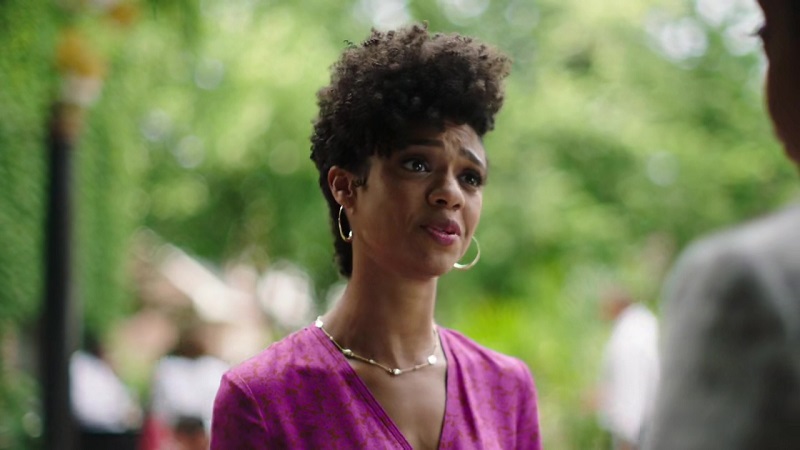
Tiffany Boone as Jerrika, The Chi Season Two
Natalie: I just think, if Tiffany Boone’s higher on the call sheet — if her story is given the same level of priority and care that Jason Mitchell’s is in that first season — then maybe she’s heard a bit more more when she makes her allegations against him.
I hope that something was really learned from that experience… not just that networks and showrunners should be more proactive and value the safety of their colleagues over story considerations, but that we can’t just throw a black woman into the mix and assume that systemic issues are going to fix themselves. That said, there was a story in the Times last week about the writers’ room on CBS’ All Rise and, despite almost all of the writers of color in the room leaving the show, the network’s decision was just to pair the white showrunner with a black woman… so, you know, I’m not convinced anyone really learned anything.
(Both CBS and Showtime are Viacom properties.)
Carmen: Given The Chi’s history and mishandling of Tiffany Boone’s sexual harassment claims, it was very hard for me to think that we would be engaging with the show ever again on this website, to be honest.
Then came Season Three! In no small part in response to what had happened the previous years behind-the-scenes, this season brought a re-energized focus on telling the stories of black women that the show had lacked in the past. One of ways that played out was with a newly diversified cast including many more black lesbian, bisexual, and trans women characters.
So to quote the Autostraddle t-shirt, “Who’s all gay here?”
Natalie: LOL!
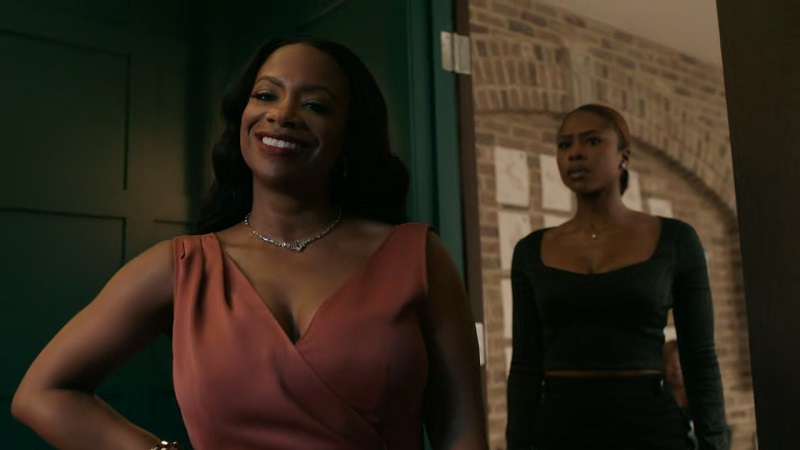
Kandi Burruss as Roselyn, The Chi Season Three
Carmen: There’s still Nina, Kevin’s mom, and Dre — formerly Karen — his stepmom. Then there’s new characters as well: Camille, Lena Waithe’s new insert who appears to be a vague stand-in for real life Chicago mayor Lori Lightfoot, the first black lesbian mayor of a major city (Camille is running for mayor of Chicago); also there’s Roselyn (played by former Xscape singer and ATL Real Housewife Kandi Burruss) — the bisexual wife of Camille’s opponent in the mayoral race; and Imani (Jasmine Davis), the trans girlfriend of Jake’s older brother, new to the scene.
Did I miss anyone? Is it possible that The Chi came from behind and somehow put forth the largest cast of LGBT black women characters that we’ve seen on television thus far?
Natalie: Aside from Pose, you’re probably right in that assessment.
Carmen: So then definitely the largest cast of black lesbian and bisexual women characters then.
Also how sad is it that the bar for this category is so low that it could be passed with… five characters? Wow.
Natalie: Don’t forget the stripper!
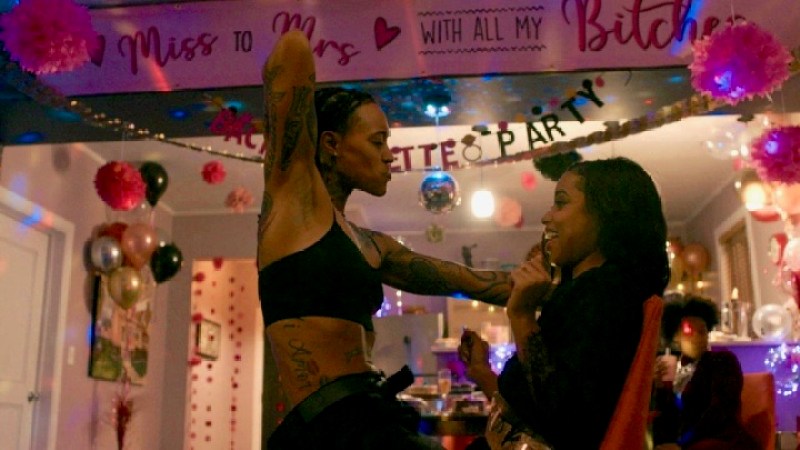
Tamara Davis as “The Season Finale Stripper” (we had too, you understand), The Chi Season Three
Carmen: HAHAA!!!! YES!!! There’s also a stud stripper in the season finale! Dreams come true.
Ok but seriously, what worked for you?
Natalie: I mean, let’s be honest and talk about what really worked for me…. Nina and Dre’s wedding and then the wedding night in the hotel. So much about those scenes felt authentic and lived in…
Carmen: I love how polite you are being for “the sex was very hot” (and it’s true! That’s easily one of the sexiest sex scenes I’ve ever seen, credit to Lena where it’s due).

Natalie: One of the things we’ve talked about with Twenties is how adept Lena is at portraying intimacy between black women in a way we haven’t seen on television before. Even when you think about how far we’ve progressed in seeing queer sexuality — with Vida and The L Word: Generation Q setting the new standards — seeing a strap-on on-screen is still a rarity.
And, so admittedly, when Dre came out, strapped up and Nina is just ready to be devoured… it was both really, really hot and really emotional to see it portrayed that way.
Carmen: Yes! absolutely!!! ESPECIALLY a brown strap-on! On a brown woman!
I think “really emotional” captures it well. We never, and I do mean literally never, get to see black queer sex scenes like that on television. I joke a lot about how great Lena Waithe’s sex scenes are, but more than that — they are important. It takes a stand that we’re here, too.
Natalie: It really does.
The other queer scene that stood out for me are the trip to the gay club with Imani and Trig, her boyfriend. He has this outburst of toxic masculinity when a gay guy mistakes him for trade and yells at Imani for taking him to a gay club in the first place. She clarifies that they’re not at the club for him; they’re there for her… so she can be back among her family.
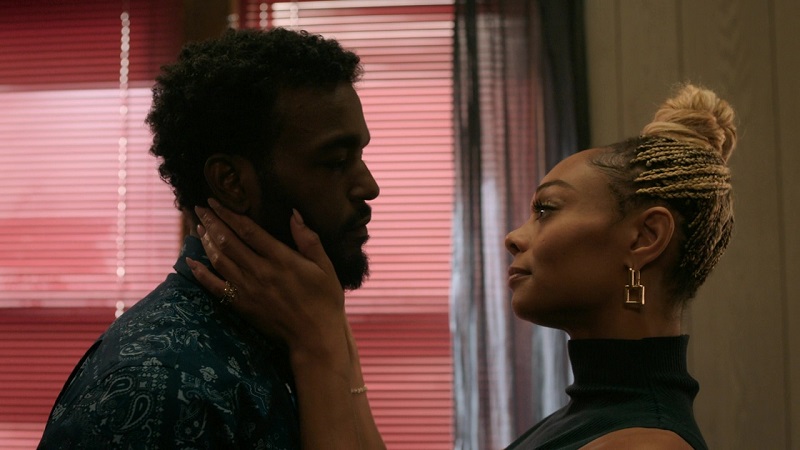
Jasmine Davis as Imani, The Chi Season Three
Carmen: Yessss, along with black women in an actual loving and supportive and sexy relationship with each other, something we almost never get to see is black trans women being loved on and supported by their partners, at all.
It matters that Imani and Trig love each other, and that she feels comfortable taking him out to the gay clubs because that’s her family, her people. And that when Trig has to deal with his own insecurities and homophobia (and the ways that overlaps with his own latent transphobia to be honest), that they are able to have a constructive, honest, and ultimately healthy conversation.
The Chi is watched by a majority black audience. Black cis men in particular — and if we’re going to be frank black cis women, too — need to see this modeled. They need to understand that loving black trans women out loud and in public isn’t something that should be shameful. The opposite message is already far too prevalent in our community and it’s causing real tangible violence and death for our sisters. It’s long past time to fix that shit.
Natalie: Absolutely!
I thought Imani’s conversation with Jake in the season finale spoke to that as well. Trans people are part of our community and are doing what we all strive to do, which is live our authentic lives:
Jake: I know what you are.
Imani: And what’s that?
Jake: You were born one way but inside you felt you were someone else.
Imani: Yeah, that’s right. How do you feel about that?
Jake: About what?
Imani: About me being trans?
Jake: I don’t give a fuck.
Imani: Really, it doesn’t bother you?
Jake: Nah, I read about it in school, and it’s not that big a deal. It’s not like you bad or nothing.
Carmen: Yes, Jake, who’s like this fifteen/sixteen-year-old cis black boy who’s looking at his new step-mother over this dinner that she cooked for him, and they are coming to an understanding. In particular they’re talking about how Imani suffered anti-trans violence and abuse from her own father and self-defense actions she had to take to save herself. And Jake kind of just takes it all nonchalantly.
Jake isn’t the kind of kid where I would use “tender” to describe him often, but that moment between him and Imani is incredibly sweet.
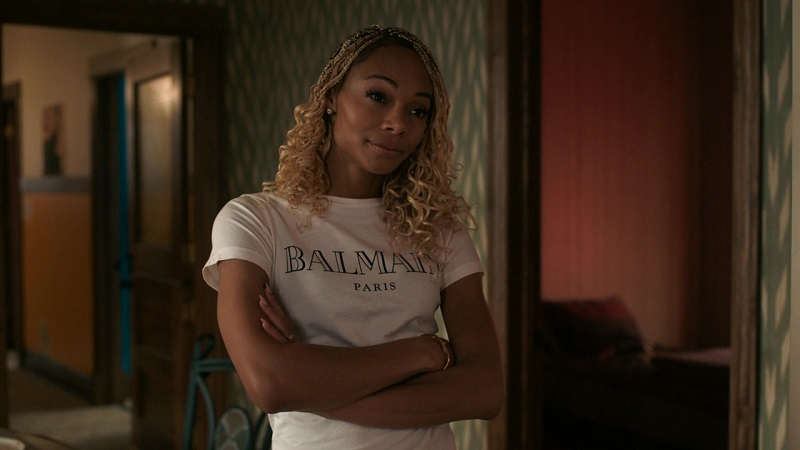
Natalie: I also like that it sets up the next conversation to be entirely about Jake not really respecting anyone telling him what to do, when it could’ve easily gone the other way.
Carmen: Yes, this moment between the two of them allows Imani to be Jake’s stepmom, and to tell him to do the dishes — and for Jake to catch a typical teenage attitude over being told to do the dishes. It allows for both of them to just become family to one another.
Natalie: Yes!
I wish they’d done more with Imani’s character, though. Mid-season there were hints that she was ready to go back to that trap house and rescue some of the girls being trafficked there, but the storyline never really went anywhere.
Carmen: Yeah. In terms of what worked well this season, for me a lot of it comes back to: bringing along majority black audiences to queer black stories and conversations that they otherwise don’t always get to see.
Like when Nina and Dre are married in the season premiere and two neighborhood aunties stop Kiesha, their daughter, to ask: “So how does it work with the lesbians? Does the femme-y one take the butch-y one’s last name?”
And then the other auntie says, “Don’t say butch-y! Say masculine presenting!”
I laughed so loud. But it’s also really nice.
Natalie: LOL.
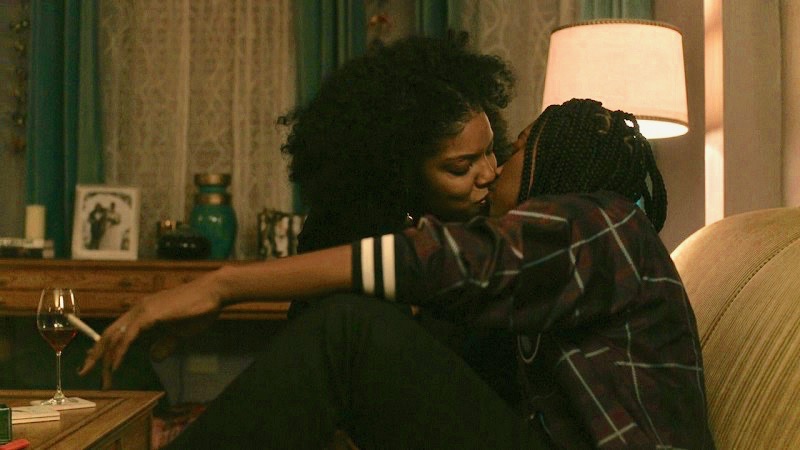
Carmen: I’ve been following The L Word rewatch that Autostraddle has been hosting with To L and Back. Though I love both TLW and Generation Q, I’ve been thinking a lot lately about Tasha Williams (Rose Rollins). And about how, even to this day more than decade later, so often the biggest black queer characters that everyone “watches” or “knows about” happen on majority white shows where they face rampant anti-blackness in the storytelling, if not also behind the scenes (paging Kat Edison in The Bold Type). What does that do for black queer people watching at home? When do we get to see ourselves living fully?
Conversely, on a lot of majority-black television shows with black audiences, queer women characters are often sidelined due to… well… homophobia. We see that with Anissa Pierce in Black Lightning or to a certain extent with the uneven handling of Nova Bordelon on Queen Sugar.
And frankly, up until this season, with Kevin’s moms on The Chi.
Natalie: Preach!
Carmen: What felt very special about The Chi this year was that there are these fully formed black lesbian wives and a black trans woman who live as a part of their neighborhood, and are loved and cared for and have independent motivations for their actions that aren’t solely predicated on their sexuality or gender. That’s rare. Even more so to have those characters, and then also have additional tertiary characters like Roselyn or Camille — who don’t have as much to do, but fill out a world that reflects our reality. A world where black queer people are part of the fabric of black communities.
So I guess that’s what I think The Chi got really right this year.
And if I ended up with a woman who loved me as much as Dre loved Nina, someone who wanted to mend me in my broken places, I certainly wouldn’t be mad about that AT ALL. Let me find a cutie who wants to split a spliff (I don’t smoke, but!) and slow dance in my living room to no music for the rest of our lives. A dream!
Natalie: I think you’re absolutely right about show’s previous failing to pen the kind of intersectional storytelling that our lives merit and that this season, The Chi, got a lot right on that front. What did you think the show didn’t get right?
Carmen: Literally everything else!
Natalie: LOL!
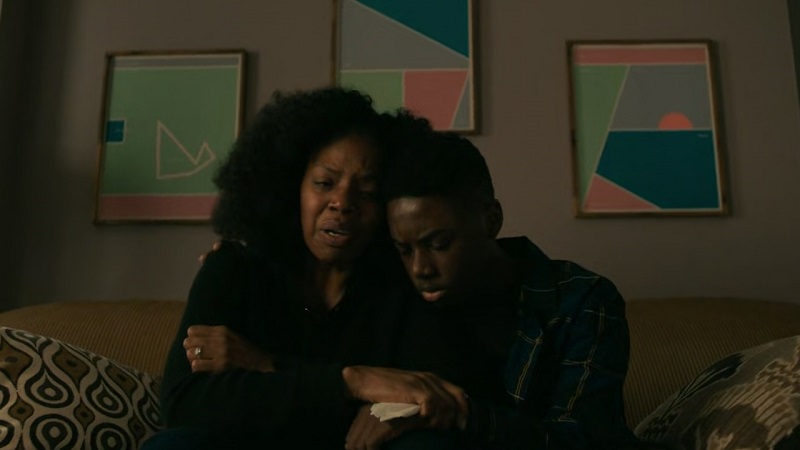
Natalie: So I don’t think I hated the rest of the show as much as you did but I wasn’t a big fan of the season overall either. I feel like the show tried to tell some important stories — like the kidnapping and trafficking on young black women and our near indifference to it — but I think the execution just felt off.
Carmen: Yes! Please say more about that! Nina and Dre’s teenage daughter, Kiesha, was abducted by a man in the neighborhood and was forced to live in his basement for months, where she was also abused and raped.
I think this is actually our biggest point of divergence in how we experienced the season because for me, “the execution felt off” doesn’t begin to cover it. We’ve talked about this a lot over the course of the season, and I’ve come to respect a point of view that says: “We don’t talk about kidnapped black kids, and especially black girls, enough. We let our girls stay missing and forgotten.” The Chi, however ineptly, is trying to enter into that conversation.
But the decision to not only kidnap Kiesha in the Season Three premiere, but then spend weeks detailing her abuse and horror in such graphic terms. I didn’t find that to be educational or a tribute — I found it to be trauma porn.
Natalie: Oh, I agree! That’s what I mean in terms of execution; it just got to the point where it felt gratuitous. It felt like they were emphasizing the trauma, even at the expense of common sense writing, as a way to force its audience to care about Kiesha and missing black girls writ large, rather than leaning into the emotional fallout — with Kiesha, Kevin, Nina and Dre — of the kidnapping. Once you cross that line, I think you undermine effective the storyline’s effectiveness at creating empathy.
Carmen: All of this!! This is what I meant when I said I disliked everything but the gay parts.
It’s a real act of a cognitive dissonance when as a queer black woman, I’m watching The Chi to see representation of my black queerness that I basically have to scrape for crumbs for everywhere else — queer black women getting to be their whole selves, not sidelined, and in their own community. But that for me to enjoy those experiences, I also have to watch the continued overwhelming torture and weight put upon a teenage black girl. On a show that already has a history of behind-the-scenes sexual misconduct.
I really don’t have another way to put it than “WTF?!?”
Natalie: I totally get that. My hope is, as frustrating as this season was, if you think about it as The Chi‘s reset — like a rebuilding year in basketball — then I think they’ve set the stage nicely for some good queer and trans storylines for next season. Trig’s going back to gang life over Imani’s apparent objections. With Douda becoming mayor, there’s space for Roselyn to really assert herself as the city’s First Lady. Nina and Dre are going to have to continue supporting Kiesha through her recovery while making sure not to lose Kevin and each other in the process.
Carmen: The Black L Word of my dreams is just around the corner. Maybe I just have to, to quote Chi-town legend Jesse Jackson, Keep Hope Alive?



“…it just got to the point where it felt gratuitous. It felt like they were emphasizing the trauma, even at the expense of common sense writing”
A thousand times yes! Why did we need to see Kiesha tortured so graphically? What does it bring to the story? On Pose bad things happen to characters, and that is realistic, but it’s not shown in graphic detail because it then becomes torture porn.
Besides the abduction story, I did enjoy the rest of the non-queer parts. I liked Emmet and the restaurant, the evolution of Kevin, Jake and Papa, etc. I absolutely LOVED Roselyn and the mayoral race.
I did a recap on LWTV, with more details if you’re interested.
https://lezwatchtv.com/2020/queerest-things-watched-last-week-the-chi-season-3-finale/
PS: The stripper scene changed my life.
Tracy!! You know this means so much coming from you! (For anyone who doesn’t know, Tracy leads the team that keeps this website up and running for all of us!! A million thanks!)
I’m also huge fans of Kevin, Jake, and Papa in particular! And also Myesha!! Always will be. But I couldn’t quite get passed the abduction story. I should say that I know Riese felt differently! And as Natalie noted, she didn’t feel ~quite as passionately about it as I did lol. I’m willing stand mostly alone on this island!
I basically want a show that’s the lesbians + the kids! lol (I’ll also take Emmett, I’ve always enjoyed his character, but this year in particular liked him a lot more with Tiffany and their love story).
How dare y’all mention these incredibly hot sex scenes without being explicit about which episodes they’re in? I have ADD and not a lot of time to sit down with a full season, and I just want the goods! 😂
Listen though! I got you!
+ For hot queer sex and some wedding feels: You want the season three premiere (3×01)
+ For some warm, gooey lesbians who cuddle by the fire and love each other through the pain: 3×09
+ For the stud stripper and that dance scene in the living room: the season three finale (3×10)
Extra Credit: The hottest sex scenes in Twenties (also mentioned in this article)
+ The premiere 1×01
+ Episode 1×05
Natalie: What did you think the show didn’t get right?
Carmen: Literally everything else!
hahahahaahaha
I was very stoked to read this and it did not disappoint!!
The Chi is a good show,and I have no issue with the LGBTQ community. But I personally hate it when producers go out of their way to promote an agenda. A lesbian couple, a trans couple, lesbian running for Mayor, and a mom who hires a butch for her daughter in laws bachleorette party all on the same shome? Trying too hard if u ask me.
What was the female stripper real name